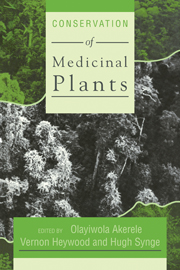Book contents
- Frontmatter
- Contents
- Contributors
- Preface
- Acknowledgements
- The Chiang Mai Declaration
- Introduction
- The Issue of Medicinal Plants
- Science, Industry and Medicinal Plants
- Techniques to Conserve Medicinal Plants
- Policies to Conserve Medicinal Plants
- 15 Policies and Organisation for Medicinal Plant Conservation in Sri Lanka
- 16 Experience in the Conservation of Medicinal Plants in Sri Lanka
- 17 The Conservation of Medicinal Plants Used in Primary Health Care in Thailand
- 18 Medicinal Plants and the Law
- 19 Let's Stop Talking to Ourselves: The Need for Public Awareness
- 20 Germplasm, Genetic Erosion and the Conservation of Indonesian Medicinal Plants
- Experiences from Programmes to Conserve Medicinal Plants
19 - Let's Stop Talking to Ourselves: The Need for Public Awareness
Published online by Cambridge University Press: 07 September 2010
- Frontmatter
- Contents
- Contributors
- Preface
- Acknowledgements
- The Chiang Mai Declaration
- Introduction
- The Issue of Medicinal Plants
- Science, Industry and Medicinal Plants
- Techniques to Conserve Medicinal Plants
- Policies to Conserve Medicinal Plants
- 15 Policies and Organisation for Medicinal Plant Conservation in Sri Lanka
- 16 Experience in the Conservation of Medicinal Plants in Sri Lanka
- 17 The Conservation of Medicinal Plants Used in Primary Health Care in Thailand
- 18 Medicinal Plants and the Law
- 19 Let's Stop Talking to Ourselves: The Need for Public Awareness
- 20 Germplasm, Genetic Erosion and the Conservation of Indonesian Medicinal Plants
- Experiences from Programmes to Conserve Medicinal Plants
Summary
Many of us, I suspect, spend most of our time speaking with people who are interested in the same things we are interested in. For example, I am in daily contact with colleagues who explain the importance of traditional medicine and related conservation issues.
Whenever possible, though, I escape from the ivory tower of conservation and meet people who are lawyers and carpenters and automechanics and cooks. By doing so I learn a sobering fact. Their priorities are not necessarily the same as ours.
This shouldn't surprise me, but it does. We're not getting our message across. You can see this for yourself. Look at the best-selling magazines on any news-stand in your country. I would bet that not one of the top ten publications is even vaguely related to the conservation of medicinal plants and traditional medicine. You'd be hard-pressed to find one out of the top 100 magazines which deals directly with the issue we will discuss all week, and to which many of us have devoted our lives.
Psychologists and sociologists tell us that the most important things in a person's life are the themes represented by these magazines – love, shelter, health, adventure, sex, food. The conservation of medicinal plants is nowhere on the list.
Does this mean the conservation of medicinal plants is unimportant? Of course not. What it does mean is that we spend too much of our time talking to ourselves.
Because the rest of the world doesn't know about our concerns they cannot support our programmes, they cannot give us money, they cannot vote for legislators who encourage conservation work, they cannot teach their children about the importance of saving plants.
- Type
- Chapter
- Information
- Conservation of Medicinal Plants , pp. 273 - 280Publisher: Cambridge University PressPrint publication year: 1991
- 3
- Cited by



